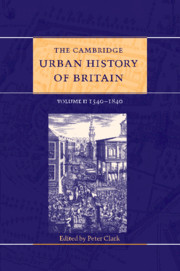Book contents
- Frontmatter
- 1 Introduction
- Part I Area surveys 1540–1840
- Part II Urban themes and types 1540–1700
- Part III Urban themes and types 1700–1840
- 14 Urban growth and economic change: from the late seventeenth century to 1841
- 15 Population and society 1700–1840
- 16 Politics and government 1700–1840
- 17 Culture and leisure 1700–1840
- 18 The transformation of urban space 1700–1840
- 19 London 1700–1840
- 20 Regional and county centres 1700–1840
- 21 Ports 1700–1840
- 22 Small towns 1700–1840
- 23 Health and leisure resorts 1700–1840
- 24 Industrialising towns 1700–1840
- 25 Conclusion
- Select Bibliography
- Index
- References
17 - Culture and leisure 1700–1840
from Part III - Urban themes and types 1700–1840
Published online by Cambridge University Press: 28 March 2008
- Frontmatter
- 1 Introduction
- Part I Area surveys 1540–1840
- Part II Urban themes and types 1540–1700
- Part III Urban themes and types 1700–1840
- 14 Urban growth and economic change: from the late seventeenth century to 1841
- 15 Population and society 1700–1840
- 16 Politics and government 1700–1840
- 17 Culture and leisure 1700–1840
- 18 The transformation of urban space 1700–1840
- 19 London 1700–1840
- 20 Regional and county centres 1700–1840
- 21 Ports 1700–1840
- 22 Small towns 1700–1840
- 23 Health and leisure resorts 1700–1840
- 24 Industrialising towns 1700–1840
- 25 Conclusion
- Select Bibliography
- Index
- References
Summary
This iron age departed, we behold,
An age of pleasure, luxury, and gold;
No more exist those opposites to Life,
A social husband, and domestic wife …
Triumphal entries and their dull parades,
Are chang’d for Op’ras, Balls and Masquerades;
No longer Sunday’s dull employment cloys,
For Church we substitute politer joys …
thus in mildly satirical vein a poetaster of the 1770s described the smart new cultural world of Georgian Britain. The sense of cultural transformation, of the new sociable importance of women, of new entertainments, of the secularisation of social life, is striking, acute – and exaggerated. As we shall see in this chapter, such changes do figure prominently in the dynamic, and increasingly pluralistic, cultural landscape of British cities during the Georgian era, but they were only part of the painting.
In contrast to the earlier period, there can be little question that cities and towns after 1700 became vital centres for cultural mixing and dissemination, affecting not only the elite classes but a good part of national society as well. The leading cities, particularly London and Edinburgh, became cultural bazaars, increasingly cosmopolitan, importing and translating cultural ideas, goods and practices from continental Europe and beyond. Urban communities became exposition centres, exhibiting the fashionable models of cultural activity, whether performances of Handel’s oratorios, meetings of a newly established learned society or the latest taste in furnishings, dress or speech. Yet British cities in the Georgian era were more than sites or stages for cultural exchange: they were also seedbeds of innovation.
- Type
- Chapter
- Information
- The Cambridge Urban History of Britain , pp. 575 - 614Publisher: Cambridge University PressPrint publication year: 2000
References
- 6
- Cited by



